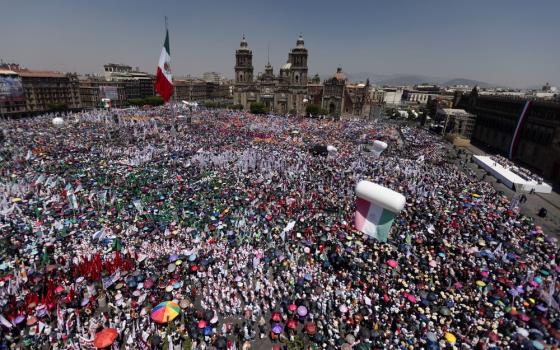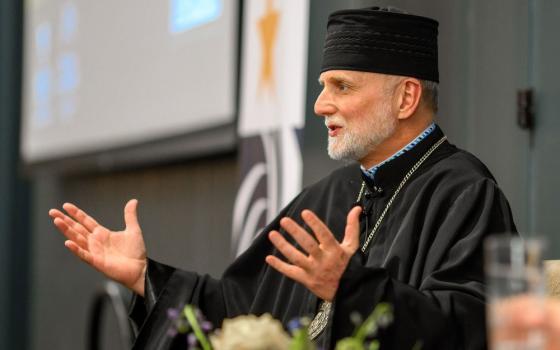
Iraqi refugees who fled violence in Mosul ride in a pickup truck Oct. 24 as they arrive in Aleppo, Syria. (CNS/Khalil Ashawi, Reuters)
No birth happens suddenly, but only after a necessary time of gestation and gradual preparation. A pregnancy begins to "show" at a certain stage, and anticipation builds in the parents and family toward the day when the baby will arrive. Who will this new person be? What will the impact of this life have on us and on the world? Something wonderful is about to happen, but it requires great labor and careful attention, for once new life is in motion, it brings uncertainty and risk. New life alters the future in ways we cannot predict or control.
Advent, which begins Nov. 27, is the time when God begins to show more prominently, stirring us to welcome the promise of Christmas. We are wise to stop everything to celebrate the Incarnation, as both a past miracle and a timeless mystery. God is in the world now as the body of the Risen Christ, whose redemptive presence and activity are the life we share and the only purpose of the church. We say we believe that God is continually being conceived and born in us for the transformation of the world. We must live it to know the truth of it.
The year ending, declared by Pope Francis an extraordinary Jubilee Year of Mercy, has added urgency to internal church reform, pastoral outreach and the prophetic cry for economic and environmental change as a matter of the survival of the planet and the common good of humanity. The symbolic doors of mercy, unsealed and opened in Rome and in dioceses and parishes around the globe have urged conversion and renewal while there is still time.
Even though the Holy Year of Mercy formally ends Nov. 20, the essential practice of mercy and forgiveness continue because they are the essence of the Gospel and every disciple's way of life. The divine face of mercy revealed by Jesus comes to stay in our lives, entering through the door of our hearts only to lead us out again to share God's unconditional love.
Francis reminds us that experience, encounter and surprise are more important than any orthodoxy of ideas and rules. Isn't this what faithful Joseph learned when a dream of angels overrode the logic of the law? He awoke unafraid to embrace Mary and her child. Isn't this how God always enters our lives? Don't be afraid to live passionately, to go to the margins where strangers become friends and lost sheep wait to be carried home again. If God is in all things, even our suffering and losses uncover new paths, unexpected blessings and growing edges we would never have known without crisis.
The voices of Matthew and Isaiah take up the story of salvation, warning us to be awake and alert lest the coming of God overtake us like a thief in the night. To resist needed change is to risk an ax to the root of the tree, a winnowing fan that separates the wheat from the chaff. A door has opened. The poor hear good news; every bodily sense is awake and attuned to the mystery of grace coursing through the cosmos like a river that makes the desert bloom.
We should not be surprised that our liturgical language and church rituals also describe the critical challenges occurring in our society and world. Isn't this what God looks like? Data becomes visible in the shifting patterns of population in our cities, as coded ideologies compete on social media, and the ethnic and cultural fabric of our communities stresses at the seams and strains to be named in our schools, workplaces, and in the public square. Refugees and immigrants arrive like Magi bearing gifts from the four corners of the world that, if we put down our fears, will renew our tired ideals.
The world is being reborn, generation by generation, and God's creation shows in trimesters of conception and gestation, our shared future dancing in the womb, eager to be born. Will we be ready?
Ready or not, God is being born again in our time, in the sweeping patterns of inevitable change and in the intimate hopes we hold as close as a newborn child.



